Related Research Articles

Johannes Erwin Eugen Rommel was a German general during World War II. Popularly known as the Desert Fox, he served as field marshal in the Wehrmacht of Nazi Germany, as well as serving in the Reichswehr of the Weimar Republic, and the army of Imperial Germany.

Paul Joseph Goebbels was a German Nazi politician who was the Gauleiter of Berlin, chief propagandist for the Nazi Party, and then Reich Minister of Propaganda from 1933 to 1945. He was one of Adolf Hitler's closest and most devoted acolytes, known for his skills in public speaking and his deeply virulent antisemitism, which was evident in his publicly voiced views. He advocated progressively harsher discrimination, including the extermination of the Jews in the Holocaust.
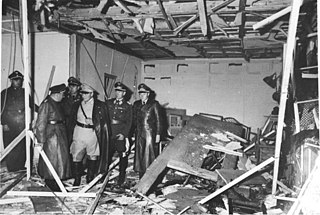
On 20 July 1944, Claus von Stauffenberg and other conspirators attempted to assassinate Adolf Hitler, Führer of Nazi Germany, inside his Wolf's Lair field headquarters near Rastenburg, East Prussia. The name Operation Valkyrie—originally referring to part of the conspiracy—has become associated with the entire event.
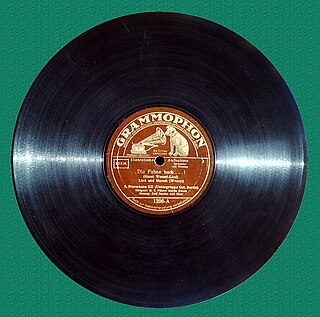
The "Horst-Wessel-Lied", also known by its opening words "Die Fahne hoch", was the anthem of the Nazi Party (NSDAP) from 1930 to 1945. From 1933 to 1945, the Nazis made it the co-national anthem of Germany, along with the first stanza of the "Deutschlandlied".

Horst Ludwig Georg Erich Wessel was a Berlin Sturmführer of the Sturmabteilung (SA), the Nazi Party's stormtroopers. After his killing in 1930, he was made into a martyr for the Nazi cause by Joseph Goebbels.

Karl August Hanke was an official of the Nazi Party (NSDAP) during its rule over Germany and served as the fifth and last Reichsführer of the Schutzstaffel (SS). He also served as Gauleiter of Gau Lower Silesia from 1941 to 1945 and as Oberpräsident of the Prussian Province of Lower Silesia. Captured on 6 May 1945, he was shot and killed by Czech partisans on 8 June.
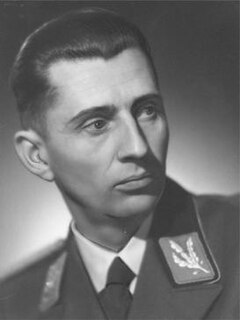
Eugen Paul Hadamovsky was a politician and radio production director in Nazi Germany from 1933 to 1942.

The Myth of the Twentieth Century is a 1930 book by Alfred Rosenberg, one of the principal ideologues of the Nazi Party and editor of the Nazi paper Völkischer Beobachter. The titular "myth" is "the myth of blood, which under the sign of the swastika unchains the racial world-revolution. It is the awakening of the race soul, which after long sleep victoriously ends the race chaos."

Rochus Misch was a German Oberscharführer (sergeant) in the 1st SS Panzer Division Leibstandarte SS Adolf Hitler (LSSAH). He was badly wounded during the Polish campaign during the first month of World War II in Europe. After recovering, from 1940 to April 1945, he served in the Führerbegleitkommando as a bodyguard, courier, and telephone operator for German dictator Adolf Hitler.
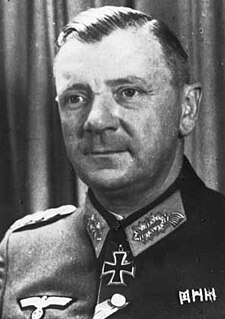
Wilhelm Emanuel Burgdorf was a German general during World War II, who served as a commander and staff officer in the German Army. In October 1944, Burgdorf assumed the role of the chief of the Army Personnel Office and chief adjutant to Adolf Hitler. In this capacity, he played a role in the forced suicide of Field Marshal Erwin Rommel. Burgdorf committed suicide in the Führerbunker on 2 May 1945 at the conclusion of the Battle of Berlin.

The Goebbels Diaries are a collection of writings by Joseph Goebbels, a leading member of the National Socialist German Workers Party (NSDAP) and the Reich Minister of Public Enlightenment and Propaganda in Adolf Hitler's government from 1933 to 1945. The diaries, which have only recently been published in full in German and are available only in part in English, are a major source for the inner history of the Nazi Party and of its twelve years in power in Germany. The British historian Ian Kershaw wrote in the preface to his biography of Hitler: "For all the caution which must naturally be attached to Goebbels's regularly reported remarks by Hitler ... the immediacy as well as the frequency of the comments makes them a vitally important source of insight into Hitler's thinking and action."

The Nazi book burnings were a campaign conducted by the German Student Union to ceremonially burn books in Nazi Germany and Austria in the 1930s. The books targeted for burning were those viewed as being subversive or as representing ideologies opposed to Nazism. These included books written by Jewish, communist, socialist, anarchist, liberal, pacifist, and sexologist authors among others. The initial books burned were those of Karl Marx and Karl Kautsky, but came to include vast numbers of authors, including Albert Einstein, Helen Keller, writers in French and English, and effectively any book that was not ardent in its support of Nazism. In a campaign of cultural genocide, books were also burned by the Nazis en masse in occupied territories.

Walter Franz Maria Stennes was a leader of the Sturmabteilung of the Nazi Party in Berlin and the surrounding area. In August 1930 he led the Stennes Revolt against Adolf Hitler, the leader of the party, and Hitler's appointed regional head of the party in the Berlin area, Joseph Goebbels. The dispute was over Hitler's policies and practices in the use of the SA, and the underlying purpose of the paramilitary organization. Hitler quelled the revolt peacefully, but after a second rebellion in March–April 1931, the SA was purged and Stennes was expelled from the party.
George Ronald Lewin CBE, later known as Ronald Lewin, was a British officer, publishing editor, radio producer and military historian.

Music in Nazi Germany, like all cultural activities in the regime, was controlled and "co-ordinated" (Gleichschaltung) by various entities of the state and the Nazi Party, with Propaganda Minister Joseph Goebbels and the prominent Nazi theorist Alfred Rosenberg playing leading – and competing – roles. The primary concerns of these organizations was to exclude Jewish composers and musicians from publishing and performing music, and to prevent the public exhibition of music considered to be "Jewish", "anti-German", or otherwise "degenerate", while at the same time promoting the work of favored "Germanic" composers, such as Richard Wagner and Anton Bruckner. These works were believed to be positive contributions to the Volksgemeinschaft, or German folk community.
The Rommel myth, or the Rommel legend, is a phrase used by a number of historians for the common depictions of German field marshal Erwin Rommel as an apolitical, brilliant commander and a victim of Nazi Germany due to his presumed participation in the 20 July plot against Adolf Hitler, which led to Rommel's forced suicide in 1944. According to these historians, who take a critical view of Rommel, such depictions are not accurate.

Rommel: The Desert Fox is a 1950 biography of German Field Marshal Erwin Rommel by Desmond Young. The book was the first biography of Rommel and enjoyed immense popularity, especially in Britain. The book led the Western Allies, particularly the British, to depict Rommel as the "good German" and "our friend Rommel", contributing to the formation of the Rommel myth.

Alfred-Ingemar Berndt was a German Nazi journalist, writer and close collaborator of Propaganda Minister Joseph Goebbels.
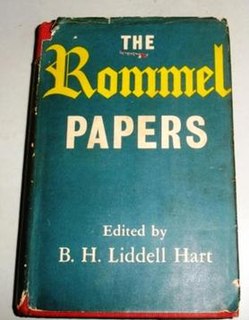
The Rommel Papers is the collected writings by the German World War II field marshal Erwin Rommel published in 1953.

A significant controversy exists over Germany's Bundeswehr's use of Erwin Rommel as its role model. Numerous critics take issue with the Bundeswehr's reverence towards Rommel as its primary role model. While recognizing his great talents as a commander, they point out several problems, including Rommel's involvement with a criminal regime and his political naivete. However, there are also many supporters of the continued commemoration of Rommel by the Bundeswehr, and there remains military buildings and streets named after him and portraits of him displayed.
References
Citations
- 1 2 3 Enrico Syring: Review: Ralf Georg Reuth, Hitler. Eine politische Biographie. In: Militärgeschichtliche Zeitschrift 62 (2003), p. 596.
- ↑ Beckett 2014, pp. 1–2.
Bibliography
- Beckett, Ian (2014). "Introduction". In I. F. W. Beckett (ed.). Rommel Reconsidered. Mechanicsburg, PA: Stackpole Books. ISBN 9780811714624.